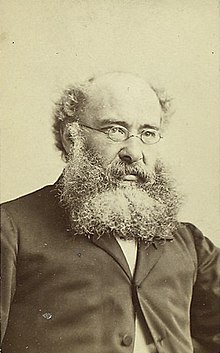Anthony Trollope | |
|---|---|
 Portrait of Anthony Trollope, by Napoleon Sarony | |
| Born | 24 April 1815 London, England |
| Died | 6 December 1882 (aged 67) Marylebone, London, England |
| Education | Harrow School Winchester College |
| Occupation(s) | Novelist; civil servant (Post Office) |
| Political party | Liberal |
| Spouse |
Rose Heseltine (m. 1844) |
| Children | 2 |
| Parents |
|
| Relatives |
|
| Signature | |
Anthony Trollope (/ˈtrɒləp/ TROL-əp; 24 April 1815 – 6 December 1882)[2] was an English novelist and civil servant of the Victorian era. Among his best-known works is a series of novels collectively known as the Chronicles of Barsetshire, which revolves around the imaginary county of Barsetshire. He also wrote novels on political, social, and gender issues, and other topical matters.[3]
Trollope's literary reputation dipped during the last years of his life,[4] but he regained somewhat of a following by the mid-20th century.
- ^ "Joanna Trollope - Literature".
- ^ Garnett, Richard (1899). . In Lee, Sidney (ed.). Dictionary of National Biography. Vol. 57. London: Smith, Elder & Co. pp. 238–242.
- ^ Nardin, Jane (1990). "The Social Critic in Anthony Trollope's Novels," SEL: Studies in English Literature 1500–1900, Vol. XXX, No. 4, pp. 679–696.
- ^ "What about Anthony Trollope? Was not Anthony Trollope popular, even during the days of Dickens and Thackeray? And who ever preached a reactionary crusade against him? Yet is he not fast disappearing from the attention of our novel readers? Trollope, unlike most successful novelists, was himself made sensible during his later years of a steady decline of his popularity. I heard a well-known London publisher once say that the novelist who had once obtained by any process a complete popular success never could lose it during his lifetime; that, let him write as carelessly and as badly as he might, his lifetime could not last long enough to enable him to shake off his public. But the facts of Trollope's literary career show that the declaration of my publisher friend was too sweeping in its terms. For several years before his death, Trollope's prices were steadily falling off. Now, one seldom hears him talked of; one hardly ever hears a citation from him in a newspaper or a magazine." – M'Carthy, Justin (1900). "Disappearing Authors," The North American Review, Vol. 170, No. 520, p. 397.